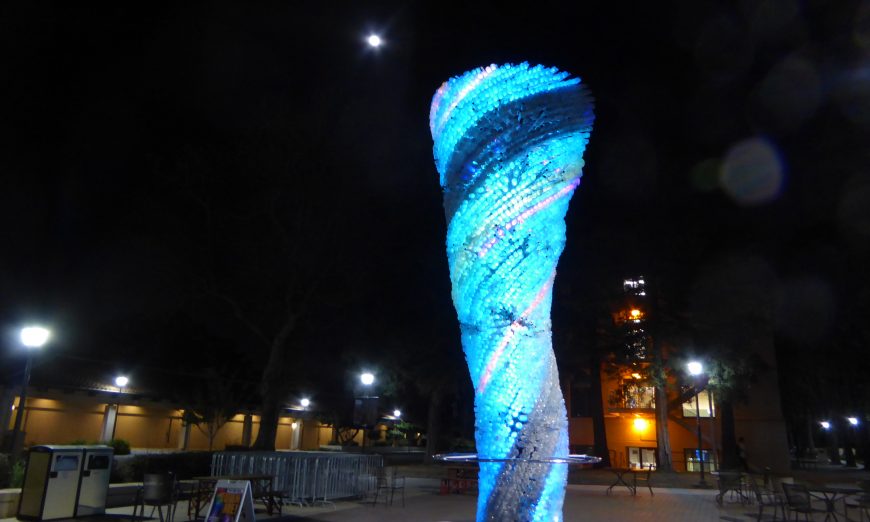Portola Valley native Martin Taylor made beauty out of old bottles — 5,000 discarded plastic bottles to be exact.
That’s how many bottles Taylor collected to create Re-Cyclone — a 20-foot-high, cyclone-shaped art installation that debuted in the summer of 2018 at the Burning Man gathering in Nevada.
Through June 17, Re-Cyclone is at Santa Clara University (SCU) in the Franklin Street Arts Paseo. The best time to view the towering, undulating work of art is after dark.
That’s when its 5,000 LED lights — one in the mouth of each bottle — are illuminated in colors that glimmer and change and twinkle. The lights are wired to a computer control system activated by the rotation of an aluminum hand wheel.
The interactive art installation spins as viewers turn the hand wheel that encircles it like a hula hoop. It has a brake to keep viewers from spinning it too hard and fast.
“Re-Cyclone is a prayer for the future that we will re-consider the price we are paying for convenience and status driven by our consumption,” said Taylor.
It took Taylor six months from conception to completion to construct Re-Cyclone at his mother’s art studio in Portola Valley. He got the inspiration for it after seeing a tornado of plastic bottles and debris skitter across the ground on a windy day.
“Creating such large, complex art takes teamwork,” said Taylor, who leads the Chromaforms Art Collective. The collective has a core group of about eight people plus other volunteers as needed.
Collecting the bottles from around the Bay Area was easy for them. They collected bottles discarded by people going through security check at San Francisco Airport. They retrieved them from yoga studios and drainage gulches off Highway 280.
Taylor, who was a mechanical design engineer at Apple before becoming a full-time artist, speaks at schools about the dangers of single-use plastic and about using creativity to solve environmental problems. High school students, who heard him speak, collected bottles at school sports events.
As a temporary, public sculpture, Re-Cyclone is designed to be portable and set up quickly. After Burning Man (www.burningman.org), it was taken to Canal Convergence in Phoenix, Arizona (www.canalconvergence.com). At SCU — its third stop — it took about 24 hours over a four-day period to re-assemble it.
Arts for Social Justice
Re-Cyclone is sponsored by the SCU Presents Arts for Social Justice program.
“We believe that it is not enough to be compassionate about a social justice issue. You must act,” said SCU Presents Director Butch Coyne. “The arts are a perfect avenue to shine a light on a variety of issues.”
SCU postgraduate student Aja Hartman paused on her way across the SCU campus to view Re-Cyclone.
“It’s interesting. I like that it’s interactive and that you’re making something out of trash,” she said. “The lights are something you’d see at a festival. And it’s good Santa Clara University supports new ideas and creative arts projects.”
City of Santa Clara Cultural Commission Chair Debra von Huene volunteers as the South Bay regional contact for Burning Man, where she first viewed Re-Cyclone. She said that the commission has been trying to find locations in the City for public art and is grateful that SCU stepped up to have Re-cyclone on its campus.
“We hope that Santa Clara can find ways to build community and a sense of iconic location though temporary public art programs,” said von Huene.
For more information about Taylor’s art, visit www.chromaforms.net. Also, look for Chromaforms on Facebook and Instagram: publicinsta.com/user/chromaforms.
Jack and Zoa, two other large public sculptures by Taylor, will be on display July 11– Sept. 15 at the Bedford Gallery in Walnut Creek.






